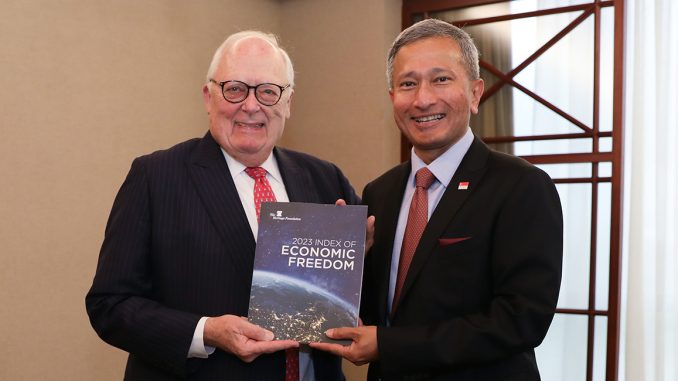
Singapore shines again.
The small but vibrant entrepreneurial nation leads global economic freedom rankings for a fourth consecutive year, as reported by The Heritage Foundation’s 2023 Index of Economic Freedom, just out.
Since the 2020 edition of the index, when Singapore outperformed Hong Kong, this highly capable Asian country has continued to demonstrate its sound economic governance and resilient competitiveness. Both characteristics are anchored in the rule of law, limited government, regulatory efficiency, and market openness, all of which The Heritage Foundation’s annual index tracks. (The Daily Signal is Heritage’s multimedia news organization.)
This is welcome news, particularly given the fact that the world’s freest economy is America’s vital economic and security partner in the Indo-Pacific region and beyond.
Singapore has a highly advanced, free-market economy. It has institutionalized an open and corruption-free environment, stable prices, and a per capita gross domestic product that is higher than that of most other developed countries.
Indeed, Singapore demonstrates in practice that economic growth and prosperity are a powerful function of policies that preserve and advance economic freedom.
For the United States, Singapore has been a longtime, reliable partner in economic and security initiatives, as well as a steadfast advocate of a strong U.S. role in the region that necessitates America’s proactive engagement to counterbalance China’s growing influence.
Indeed, America and Singapore both have benefited from extensive economic engagements over the past decades. The U.S.-Singapore trade agreement, in force since January 2004, was America’s first bilateral pact to institutionalize a trade framework with an Asian country.
With more than 5,000 American companies operating in Singapore, many of which use the freest economy in the world as their hub for Indo-Pacific business activities, the U.S. is by far the largest single-country investor there.
The cumulative level of America’s foreign direct investment in Singapore amounts to over $300 billion, exceeding our foreign direct investment in India, China, and South Korea combined.
At the White House welcoming ceremony some four decades ago for Singapore’s founding prime minister, Lee Kuan Yew, a fierce anti-communist and America’s stalwart friend, President Ronald Reagan underscored the common bond:
[R]elatively free and open trade has been a key element of our success. Your country has one of the most open trading markets on the planet. A principal foreign policy objective of the United States is to protect and expand free trade by opening markets now closed or unfairly regulated. … Protectionism is a threat to the living standards our people have worked so hard to build. Once unleashed, it will set in motion a cycle of reaction and paralysis, eventually destroying those it claims to protect.
“Our two peoples, though separated by thousands of miles, have much in common,” Reagan noted. “We both cherish our political and economic freedom.”
From a broader foreign policy perspective, as a proven partner in Asia and beyond, Singapore consistently has punched above its weight in regional and global affairs by pragmatically reinforcing shared values and a common desire for peace and security.
America’s latest Indo-Pacific strategy specifies the objective of advancing “a free and open Indo-Pacific that is more connected, prosperous, secure, and resilient.” To that end, the U.S. and Singapore have worked closely by amplifying the strength of the bilateral strategic partnership.
As the global economy faces new challenges from expanding Chinese influence, a free and open Singapore matters more than ever to America and the world.
Have an opinion about this article? To sound off, please email letters@DailySignal.com and we’ll consider publishing your edited remarks in our regular “We Hear You” feature. Remember to include the url or headline of the article plus your name and town and/or state.

Be the first to comment